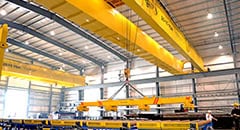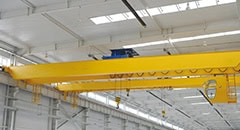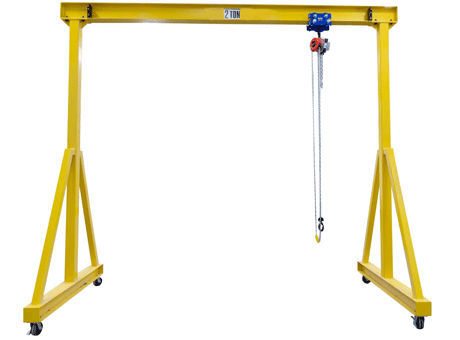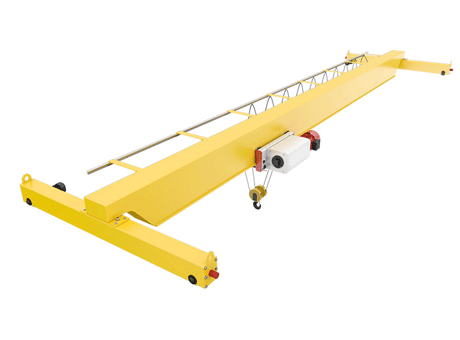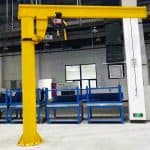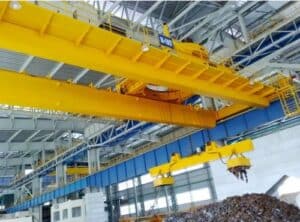As a kind of vertical transportation lifting equipment, the gantry crane uses the ground winch as the power and uses the wire rope lifting method to lift the hanging basket along the guide rail to achieve the purpose of transporting materials. It is widely used in building construction. If a customer wants to customize a portaalkraan, the main processes are as follows:
1. Frame production
⑴Design plans, drawings, calculations and quality assurance measures are required;
⑵ There must be a product sign indicating the intended lifting capacity, maximum lifting speed, maximum erection height, product number and date;
⑶After the frame is installed, it must be formally inspected and accepted before it can be used if it meets the requirements.
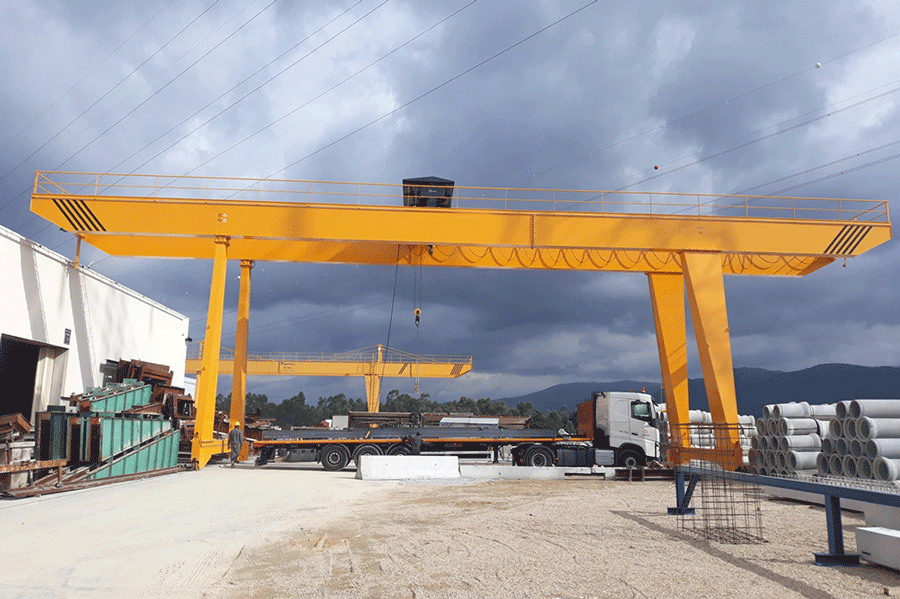
2.Safety protection device
⑴Safe parking device (basket positioning) or rope break protection device (when the rope is broken, it can be reliably stopped and fixed);
⑵ The parking railing (protective door) at the floor entrance: adopts an interlocking device (it can only be opened when the hanging basket is in place);
⑶Safety door of the hanging basket: automatically lifts to prevent materials in the hanging basket from falling and injuring people;
⑷Protective shed for the loading port: the width is adapted to the gantry, and the length is not less than 2 meters;
⑸Upper limit limiter: When the hanging basket is raised to the highest position, it automatically stops;
⑹Emergency power-off switch: In case of emergency, the main control power supply of the hoist can be cut off in time;
⑺Signaling device: The audio device controlled by the driver can enable various signals to be heard on each floor.
3. The frame needs to be stable
⑴The frame of portaal hyskrane must be rigidly connected to the building and is not allowed to be connected to the scaffolding or the material receiving platform;
⑵ Set up one set of water ropes when the height is below 20 meters, and set up two sets between 20 and 30 meters;
⑶The water rope must use steel wire rope, and the diameter shall not be less than 9.3mm, and the angle shall be 45~60°;
⑷The water rope must be fixed with anchors; both sides of the frame should be protected by safety nets.
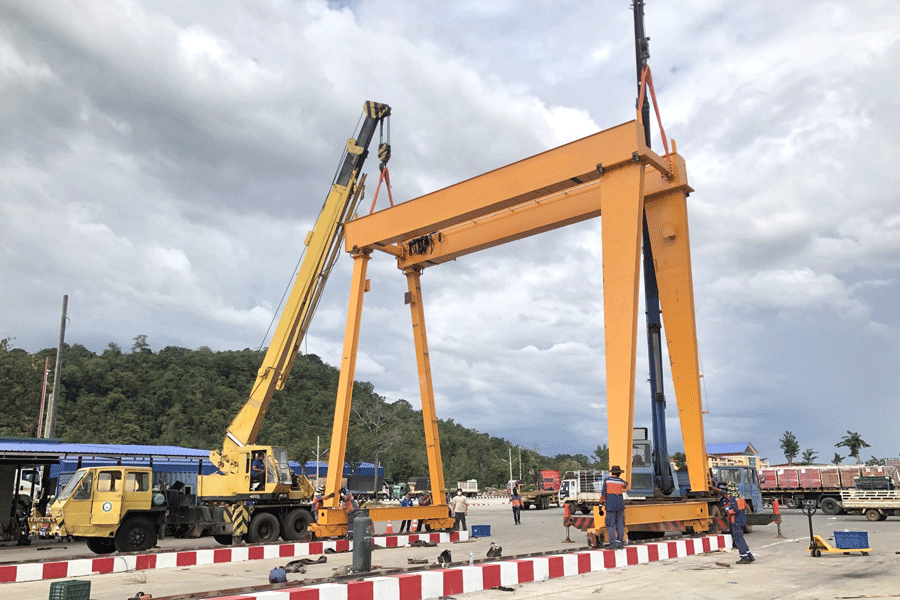
4.Wind machine
⑴There should be two construction piles in front of the winch and at least two directional piles on both sides;
⑵The winch wire rope should be wound neatly. When the hanging basket is away from the ground, the hoist wire rope must have at least 5 to 7 turns;
⑶ The winch should have an operating shed and meet the requirements; the installation should not affect the driver’s operation and inspection.
In addition, during daily supervision and inspection work, it was discovered that there are many potential safety hazards in the production, installation and use of the gantry, and the problems can be described as diverse. Combined with the actual situation of various types of supervision and inspection, it can be summarized into the following aspects:
Due to the large amount of use of gantry, especially the low-rise gantry, due to the simple production process and the lifting height of less than 30m, it mainly solves the material transportation of multi-story buildings. Therefore, in addition to the production of professional manufacturers, some are also produced by the user themselves. design production. There is a large batch of products that do not strictly follow the “Safety Technical Specifications for Gantry Frames and Material Hoists” (JGJ88-92). The design and production quality is rough, and there are many hidden dangers during installation and use.
1. The “Safety Technical Specifications for Gantry and Material Hoist” (JGJ88-92) clearly stipulates that as a force-bearing component that directly bears the hanging basket and working load, the gantry sky beam must be made of two 14# channel steels. However, most of the gantry roof beams used on site are made of 12# or even 10# channel steel, whose bending strength does not meet the requirements and is prone to bending deformation, posing safety hazards.
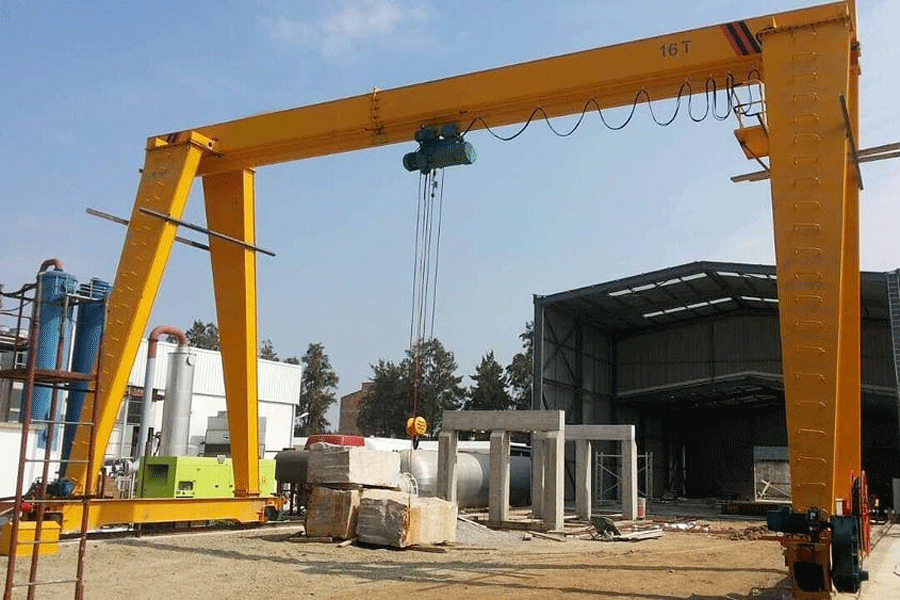
2. When some gantry frames leave the factory, they do not have protective railings or safety baffles on both sides of the hanging basket as per the specifications.
3. For old gantry crane frames where some of the columns are welded from steel pipes and round steels, after the standard joint strips are damaged, the installation or user units will replace them with rebars.
4. For the gap between the hanging basket and the frame body, that is, the gap between the hanging basket guide shoes and the guide rail, formal gasket adjustment is not used. Instead, rebar or even U-shaped cards are used as pads between the guide shoes and the hanging basket. piece.
5. The ground pulley does not match the steel wire rope, and the diameter is too small. The ratio of the pulley diameter to the steel wire rope is less than 25 for the low frame and less than 30 for the elevated frame. If the diameter of the pulley is too small, it is easy to cause fatigue breakage or excessive bending of the wire rope, which intensifies the wear of the wire rope and affects the service life. In addition, some ground steering pulleys are not rigidly fixed as required but are flexibly connected.

